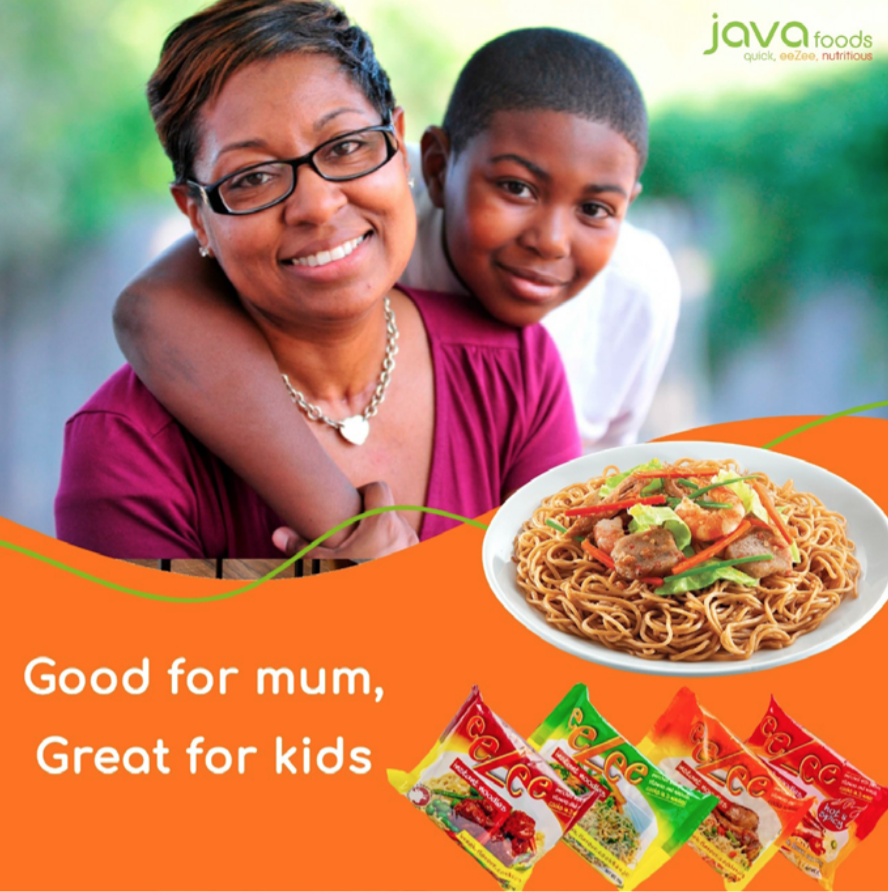
Making Local Noodle Company 100 Percent Zambian
For the past nine years, Java Foods has steadily built demand for its fortified instant noodles throughout Zambia. Though it’s a Zambian brand, the noodles themselves had always been produced in Asia under a co-pack agreement and imported. That is until 2020, when Java opened their new noodle production facility in Lusaka.
“It was time to transition to manufacturing locally. And to get it right the first time, we needed professional help to maintain or improve on the trusted brand we had created. This is where PFS fit in perfectly,” said Java Production Manager Stephen Opondo.
Bart Bender, Ardent’s technical services manager in Wisconsin, and Xin Liu, who has recently left Ardent Mills after five years, worked together on formulating the new noodles. They helped select the best flour for the product, coordinated the flour and noodle tests done in the U.S. lab and sent samples back to Zambia for their evaluation.
Though Bart has over 35 years of experience in the flour milling industry, he still learned something new during the project. “I didn’t know much about the quality and consistency parameters for the flour and oils available in that area (Southern Africa).” he said. “Those issues were greater than expected and needed to be realized in our evaluations.”
That deep knowledge and attention to detail really paid off for the Java team. “Their knowledge in food processing was unmatched. The kind of dedication they gave to the project was so encouraging and they were very free in sharing their knowledge,” said Stephen.
Java Foods Founder Monica Musonda agrees and says PFS support over the years has helped them to think big. “We want to see Java become one of the big food processors and consumer goods manufacturers in Southern Africa – focusing on producing food that is good for the community. We hope to add new foods to our portfolio and also export into the region,” she said.
And Bart may even have the opportunity to help Java in realizing that goal. “I loved watching the video of the Java team producing instant noodles on their production line. A job well done!” he said. “This was my first project with PFS and I will be looking for another to join.”
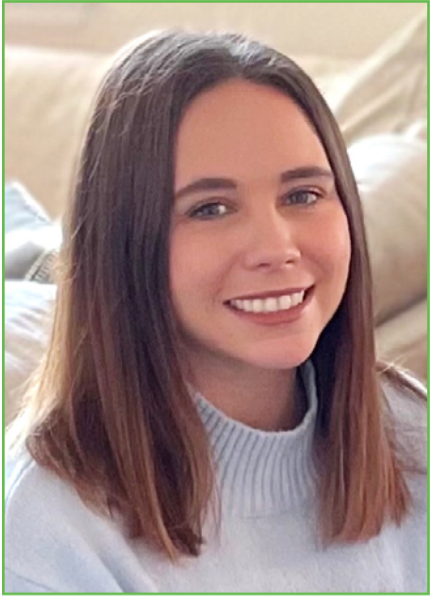
Volunteer Spotlight: Kailey Bullock
Kailey Bullock is a specialty grain merchant and has worked with three Partners in Food Solutions clients: Spice World in Kenya, Supa Seki and Sozi Integrity Trading, both located in Tanzania.
PFS: Tell us about yourself and your role at Ardent Mills.
KB: I developed a passion for agriculture at a young age by growing up in the ag industry in Texas. Now I reside in Colorado and enjoy spending time outdoors. At work you will find me purchasing numerous commodities as a specialty grain merchant for The Annex.
PFS: What is your main motivation for volunteering with PFS?
KB: To help feed the world.
PFS: Why did you choose to volunteer as a Client Lead?
KB: I volunteered on a few projects throughout the past couple of years and really enjoyed it. Being a Client Lead is a slightly different kind of opportunity with PFS.
PFS: What’s your favorite part of volunteering with PFS?
KB: Directly making a positive impact on clients in the food industry who want to make a difference in the world. Through PFS, clients receive guidance through challenges and solutions to better enhance their operation. PFS does a great job putting together a diverse group of volunteers to reach the clients goals for the project.
PFS: If someone is hesitant to volunteer with PFS, what would you say to them?
KB: Self growth revolves a lot around putting yourself out there and trying something new. It is very rewarding when helping someone in need by giving a little bit of your time and expertise. PFS creates a support system for both clients and volunteers by strategically putting teams together.
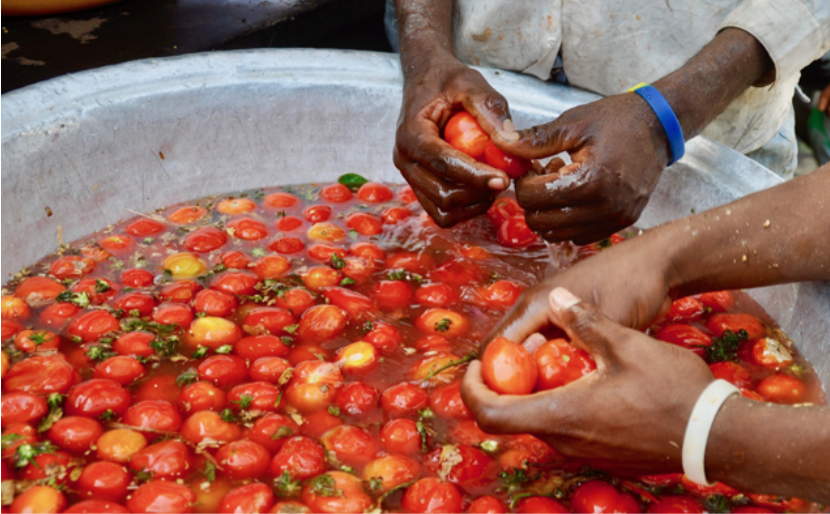
Simple Questions Lead to Elegant Solutions
Sometimes it’s the simple questions that reveal the most important answers. That’s what Ardent Mills’ Bill Boyden discovered while working with Tomato Jos, a tomato processing company in Kangimi, Nigeria. The company was formed to process locally grown tomatoes - in season for only a short time - into paste so that the tomato harvest bounty can be preserved.
Tomato Jos was in the process of building a new warehouse to help expand their business and optimize the space for both raw materials and finished goods. At the same time, a staffing and process optimization project began for their expected growth. That is where Bill became involved. “I literally had no previous knowledge of tomato processing at all. So, Tomato Jos may have wondered why I was asking a lot of simple questions.” he said. “This project helped me to understand the dynamics of the supply chain – the seasonality of the farming activities, limited time from harvest to processing due to no storage, plant operations only scheduled for a few weeks based on their year-one business targeted sales – and the difficulty of creating an efficient staffing plan with all these considerations.”
It was these simple questions that helped lead them to a very customized three-phase staffing plan that would allow them to develop and upskill their staff at the same time that their business was shifting from raw materials to finished product production. “A staffing plan was developed which included several key benefits: team members from the adjacent farming operation could support raw material unloading and maintenance resource needs, inexperienced team members assigned to entry level roles would be provided with learning and development opportunities that would allow them to grow and expand their responsibilities for next phase of roles as the plant progressed. This changes provided a more optimal structure for plant supervision, engineering and laboratory functions,” said Bill.
Ironically, Tomato Jos noted that the real life value of appropriate staffing and systems is evident in how PFS itself works. “Our favorite thing about working with PFS has to be how committed the team is to getting us high-quality volunteers,” said Processing Manager Francis Bulus. “It’s evident in how, at virtually every point, the team communicates its volunteer recruitment plans, philosophy, and status to us, as well as how clearly they often map out our expectations and how these have to align with theirs.”
Tomato Jos management reports that recruitment is currently underway for the second stage of their operations, exactly in accordance with their elegant plan.
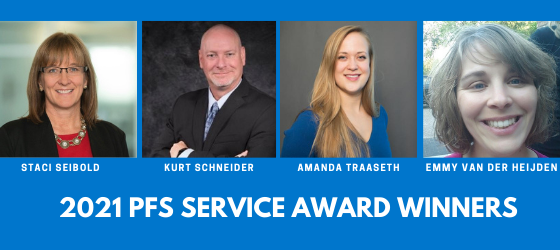
Join Us In Celebrating Our Third Annual PFS Service Award Winners
Every year, we honor several special individuals for their outstanding contribution to Partners in Food Solutions. Named after our founders, John Mendesh and Peter Erickson, these awards go to people who most demonstrate enthusiasm, drive for results, employ creative problem solving, and show tenacity, grit, wisdom, and humility. After receiving 40+ nominations, we are excited to share this years award winners...
Emmy van der Heijden, DSM, Project & Project Engineer (John Mendesh Award)
"Emmy's ability to piece together complex moving parts to make them meaningful is a skill most people desire but few people possess. She does it all with a smile on her face. Her laughter and excitement for each meeting is contagious."- Gloria Maamee Abena Otoo, PFS.
Amanda Traaseth, PFS, Director of Operations (John Mendesh Award)
"Ever since Amanda joined PFS, she's added structure to our processes and formalized the way we do things in the field and she does it with boundless enthusiasm and a smile! I see her a the mother of the Direct Team!" - Christian Dedzo, PFS.
Kurt Schneider, PFS, Senior Advisor (Peter Erickson Award)
"Kurt has always been there for the Direct Team. He provides great advice, helps manage the team, and used his expertise to design and execute pilots for certifications and labs that were instrumental for our clients." - Erika Smith, PFS.
Staci Seibold, General Mills, (Retired) VP of Innovation, Technology and Quality (Peter Erickson Award)
"Staci's boundless enthusiasm, warmth, and creativity has been a bedrock of PFS from our inception. She has done as much as anyone to build an inclusive community of volunteers. So much of our volunteer community has its roots in her commitment and engagement." - Jimmy Bettcher, PFS.
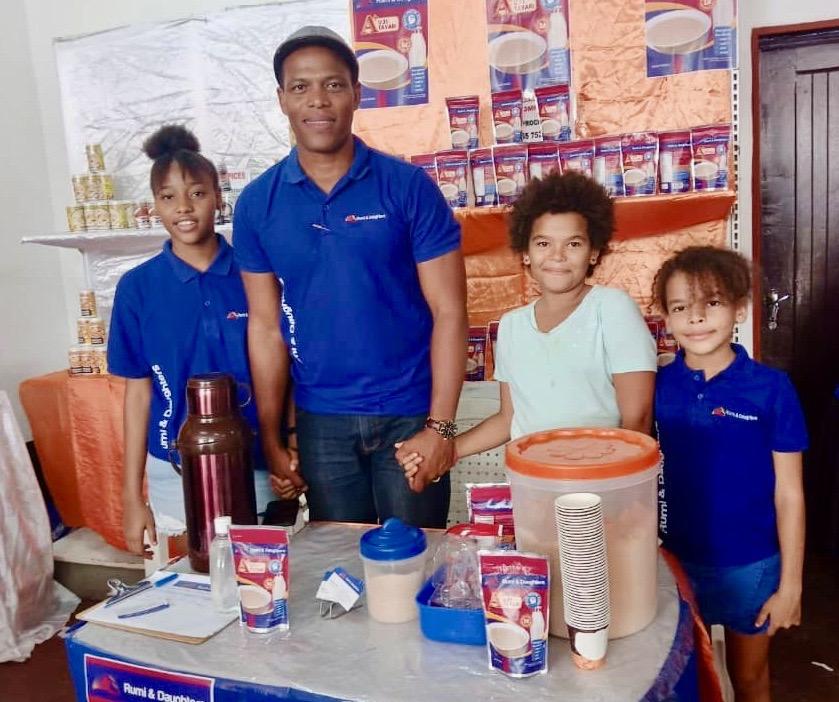
Cargill’s Aziz Rehman Helps Make Company’s Journey “shorter, straighter and smoother”
In 2019, Aziz Rehman joined Partners in Food Solutions as a new volunteer. While looking for an opportunity to get involved, he was introduced to Rumishael and Daughters, a grain- based breakfast food start-up based in Tanzania. “I knew I wanted to work with Rumishael and Daughters because I felt like there was a lot for us to learn from one another,” said Aziz. “Volunteering as their Client Lead, I’ve had the opportunity to see their company grow from a small start up in 2019, to introducing their first product to market, to now – expanding their product portfolio after much success.”
Robyn and Rumishael, founders of Rumishael and Daughters, dreamt of starting a family-owned business that made a positive impact on the local Tanzanian community. After 13 years of living in New Zealand, the husband and wife duo made their dreams a reality and moved back to Tanzania with their three children to start Rumishael and Daughters. “We spent years ideating what Rumishael and Daughters could be and ultimately decided that we wanted our company to produce nutritious, tasty and affordable products made with locally-grown grains. We’re really fortunate to have Partners in Food Solutions and their volunteers as advisors. As a start-up, having PFS volunteers who selflessly offer their precious time and expertise to ensure our success, especially given how young and fragile our company is, has been absolutely invaluable and helped develop our confidence,” said Robyn.
As a Client Lead, Aziz’s role is to support Rumishael and Daughters by helping manage their project portfolio. Since Aziz started in the role, he has overseen more than seven projects ensuring the projects go smoothly and reach their objectives. “I’ve thoroughly enjoyed working with Rumishael and Daughters,” said Aziz. “I’ve learned so much about product development and marketing, and have seen Rumishael and Daughters reach milestone after milestone. This has been a great opportunity to improve people’s lives across Africa while working remotely.”
Rumishael and Daughters is currently working on some new projects including developing new products and creating a marketing strategy. Furthermore, Rumishael and Daughters has started the process of partnering with the World Food Programme and will produce super cereals for them in the near future. “Partners in Food Solutions and Aziz have helped us make Rumishael and Daughter’s journey shorter, straighter and smoother. We really enjoy and appreciate working with Aziz. He is a constant source of support to us. He is committed to our success and we are incredibly grateful. When our factory laboratory is more sophisticated and worthy of a name, we plan to name it the ‘Aziz Rehman Laboratory’.”